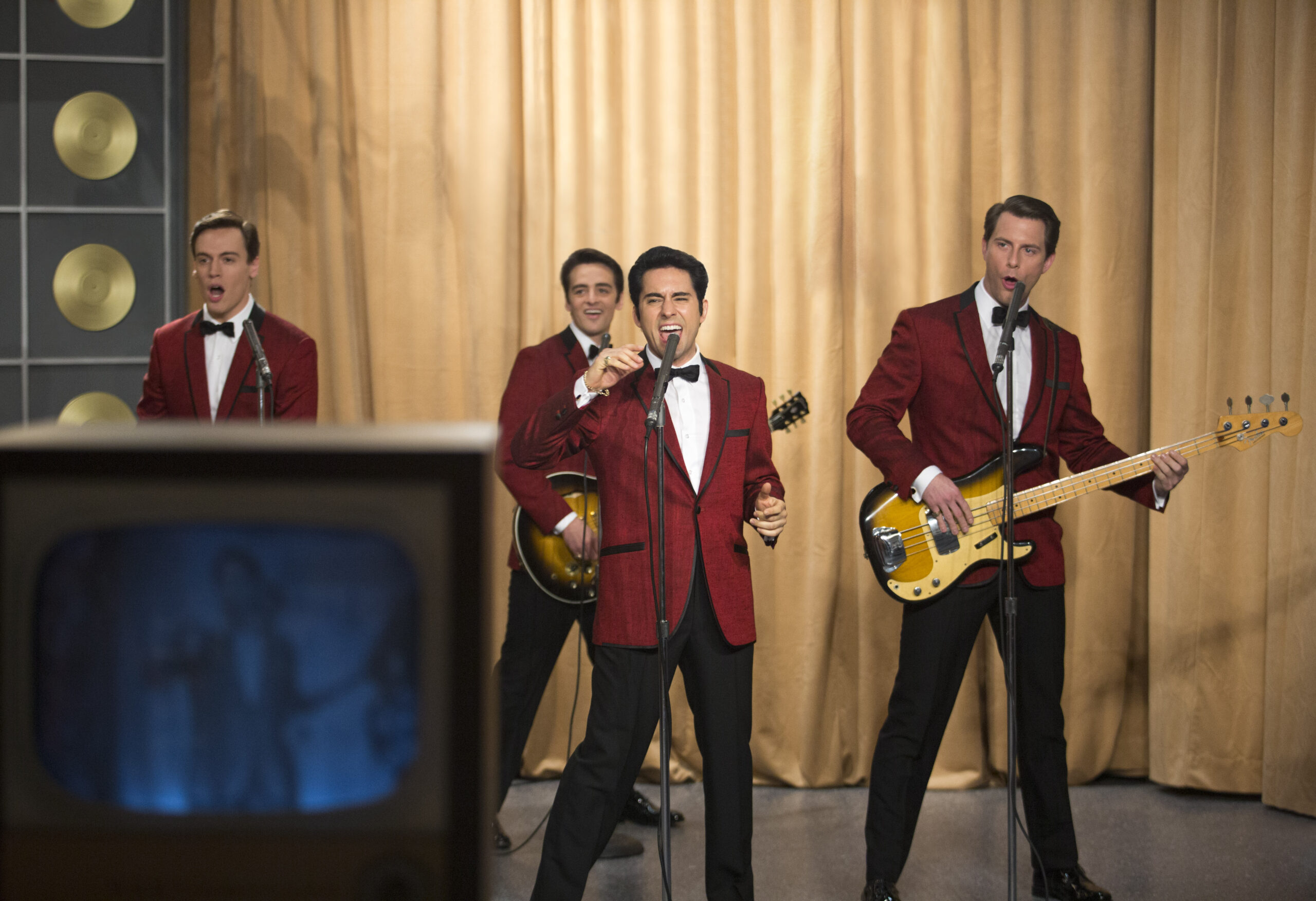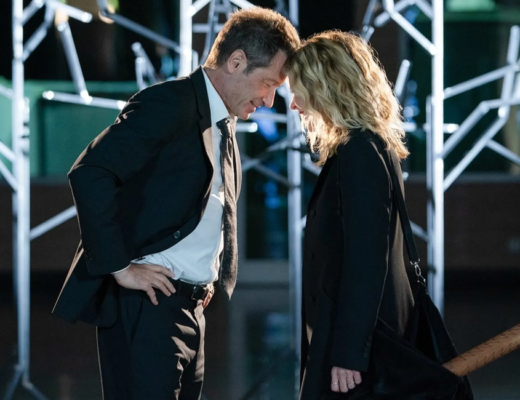The first thing you may notice about Jersey Boys is the lighting—or more specifically, the light sources. Set mostly in darkened rooms that look as if all the air’s been sucked out of them, numerous shot point to light sources in the foreground: table lamps at a nightclub, spotlights shining down on performers, streetlights lining a small American town. In this evocatively melancholic context, the almost garishly bright lights—a masterstroke of Tom Stern’s exquisite cinematography—reveal a show-business artifice that director Clint Eastwood aims to expose. It’s merely one many fascinating aspects that make Eastwood’s screen adaptation of the 2005 Broadway hit tracing the rise of Frankie Valli and the Four Seasons one of the most beguiling mainstream Hollywood films in recent memory.
The contemporary movie musical has been pronounced dead as many times as film itself, though it certainly isn’t gone—cf. Chicago, Sweeney Todd, Les Misérables, not to mention atypical works like Once and Pitch Perfect). Jersey Boys fits closer to the former group, but Eastwood’s approach to the film is almost directly antithetical to the style of, say, a Rob Marshall film; it’s not a flashy, swinging, upbeat entertainment, but a drawn-out, heavy-spirited drama intent on investigating the carefully cultivated public image of, and the harsher realities behind, this prototypical boy band. There’s no sense of myth-making that arises from the awe of watching these men swing their hips as their high falsetto voices deliver ballads like “Sherry” and “Big Girls Don’t Cry” to an audience of teenage women. Instead, Eastwood’s classical aesthetic gives full weight to the fraught insecurities of the artistic process, the minds that divide even as the songs come together.
Jersey Boys swaggers out of the gate with the camera roving into a deliberately faux-Goodfellas set-up, with Tommy DeVito (Vincent Piazza) introducing us to both the small New Jersey town of Belleville—shown here, tellingly, as a deliberately artificial set—and the mobsters who run it. (The Goodfellas connection is strengthened by an appearance from the young Joe Pesci—who not only helped the Four Seasons get together, but would later play a character named Tommy DeVito in the Martin Scorsese film—as part of the cast of characters.) Tommy informs us there are only three ways out of the town—death, prison, or becoming famous—so you can guess why he gathers his friend Frank (John Lloyd Young), his brother Nick (Michael Lomenda), and, more ambivalently, songwriter Bob Gaudio (Erich Bergen) to form a group.
Unlike most musicals this brisk, though, Jersey Boys is never in a rush to get anywhere. Eastwood’s camera sinuously surrounds the drama, creating hollowed spaces where the characters debate, think, and simply breathe in the atmosphere. Instead of proceeding song after song, there are long bits of downtime between each of the hits, allowing the film to focus squarely on the internal struggles of the group. Even when staging the musical numbers, Eastwood prefers an atmosphere of simplicity rather than the expected florid spectacle. When Bob auditions for the group, each member gradually starts singing with him, and Eastwood emphasizes shot-reverse-shot techniques that are calmly seductive rather than showy (this scene in particular focuses on two barmaids that begin slow-dancing). The scene ends with the camera moving in front of—what else?—a light source, the rays of light seemingly turning the boys into instantaneous legends.
Unlike most musicals this brisk, though, Jersey Boys is never in a rush to get anywhere. Eastwood’s camera sinuously surrounds the drama, creating hollowed spaces where the characters debate, think, and simply breathe in the atmosphere.
Speaking of boys, whether this was a project Eastwood walked into or not, there is certainly something to be said about his auteurist relationship to the material in the way this lovebird quartet is portrayed as a height of masculine strength. Granted, Valli’s high voice is miles away from the rugged, hard-ass tone of Eastwood’s characters from the Sergio Leone and Don Siegel films that helped establish his reputation. And yet, there’s one thematically pertinent, if wholly strange, scene that suggests his deeper macho concerns. Eastwood himself appears in the scene—in the episode of Rawhide that Bob watches on-screen, ignoring a party of willing, high-heeled women until he’s dutifully interrupted by the men to have one of these gals strip him of his virginity. The television set is turned off, and Bob emerges as a confident man after completing the deed. Maybe Eastwood isn’t fully conscious of the homoerotic idealization of his own former iconic self that’s going on here, but, in its tantalizingly odd implications, it’s certainly one of the most bizarrely compelling moments the director has ever stitched together.
“Bizarrely compelling” could, in fact, be applied to Jersey Boys as a whole. Instead of delivering a musical in either the contemporary intensified-continuity style or the classical style of, say, Vincente Minnelli’s simple tracking shots and colorful mise-en-scène, Eastwood has managed to stamp his own personality all over material that one would assume he is completely wrong for. The film meanders through the hits, detouring via its four, fourth-wall breaking voiceovers that begin often in the middle of a scene without breaking the shot, suddenly shifting the weight of the mise-en-scène in a way that feels genuinely fresh.
This is not to say Eastwood’s trademark style is without fault. On set, he’s known for allotting just one take for a scene, and never bothering to revise the scripts he directs, preferring to shoot them as written. As a result of Eastwood’s non-interventionist restraint, certain aspects of Jersey Boys stand out as unpolished—most notably subplots involving Valli’s wife and rebellious teenage daughter, in which these thanklessly written supporting characters seem to exist only to create extraneous drama for the Four Seasons lead singer. These sequences feel overacted, under-written, and laborious in ways that amount to dead weight.
Yet, warts and all, there is something rather admirable about a movie musical like this that has no interest in fulfilling expectations of frothy “fun.” The film’s big climax, Valli’s debut of the breakthrough hit, “Can’t Take My Eyes Off You,” plays as a purely emotional moment between Valli pouring his heart into his singing, and Eastwood focusing on the eyeline matches of women who meet Frankie’s own romantic gaze, as if each woman imagines the song was written personally for her (Ed. cf “I’m Easy” in Nashville). Then it’s off to the finale—with that exaggerated old-age makeup of Eastwood’s J. Edgar reappearing for the group’s 1990 Radio City Music Hall performance as their songs are interrupted with more fourth-wall griping—and then, finally, an end-credits sequence that evokes Minnelli and Donen, as if Eastwood has finally decided to embrace the legend of Frankie Valli and the Four Seasons now that the creation story has been told in full.
This is all to say that Eastwood is hardly slumming it with his choice of material here. Instead, he has turned Jersey Boys into one of the oddest works of his career, confounding genre expectations by fashioning a heavy, if sometimes awkward, affair out of a supposedly cheery Broadway show. He’s directed a musical the only way that he could: by draining it of mythic qualities, digging underneath the lighthearted surfaces in order to try to find the emotional truths beneath them. The whole film plays like a feature-length extension of that 15-minute sequence near the end of Eastwood’s A Perfect World, in which Kevin Costner sits dying in the field after a belabored stand-off, the director eschewing conventional thrills for something much weightier. Tommy tells us near the end of Jersey Boys that they were just “four guys under a street light.” Eastwood’s film, however, acts, in thrillingly idiosyncratic ways, as a feature-length deconstruction of that myth.







